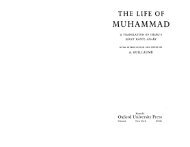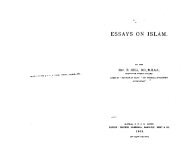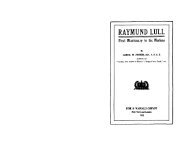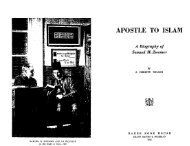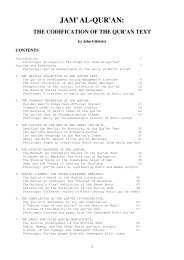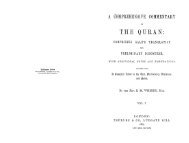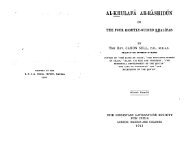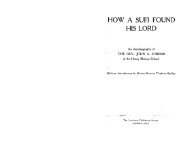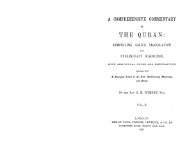Islam Its Belief and Practices - Radical Truth
Islam Its Belief and Practices - Radical Truth
Islam Its Belief and Practices - Radical Truth
You also want an ePaper? Increase the reach of your titles
YUMPU automatically turns print PDFs into web optimized ePapers that Google loves.
72 ISLAM ITS BELIEFS AND PRACTICES THE PRESCRIBED DUTIES 73<br />
the master being rich, the delivery of the<br />
zakat to him is illegal. On the similar ground<br />
it is illegal to bestow zakat upon the infant<br />
child of a rich person. On the contrary an<br />
adult child of a rich man; who is poor may<br />
receive zaka.t. The same rule applies to the<br />
wife of a rich person. She, if she be poor,<br />
is not accounted rich in the property of the<br />
husb<strong>and</strong> <strong>and</strong> hence may receive the zakat.<br />
(7) Banu-Hiishim. By the tribe of Hashim are to<br />
",<br />
be understood the descendants of 'AIr,<br />
'Abbas, Ja'far, 'Aqil <strong>and</strong> HariIh . b. Matlib . ,<br />
all these deriving their descent from Hashim,<br />
the great-gr<strong>and</strong> father of Mu1,lammad.<br />
Sadaqalu' I-Pilar, The Alms of Breaking The Pasl.<br />
~adaqatu'l-Fitaris the alms bestowed upon the poor on<br />
'Idu'l-Fitar, the feast of the breakingofthefast of Ramagan.<br />
It is incumbent (wO-jib) upon all free Muslims. The obligation<br />
is founded on a precept of Mu1,lammad, who, in<br />
course of a discourse upon the 'Idu'l-Fitar said: "Let every<br />
person, whether infant or adult bestow upon the poor<br />
half a-~a' of wheat, or one ~a' of millet or of barley".<br />
It is incumbent upon a man to pay ~adaqatu'l-Fitar on<br />
behalf of his infants <strong>and</strong> slaves (male <strong>and</strong> female). The<br />
provision of the children is a debt upon the father, wherefore<br />
the accomplishment of the ~adaqamust also rest upon<br />
him, this being considered as a part of their prpvision.<br />
Similarly a man must pay the ~adaqa on behalf of his male<br />
<strong>and</strong> female slaves, he being their guardian, <strong>and</strong> their<br />
subsistence depending upon him. On the other h<strong>and</strong> it<br />
is not incumbent upon men to give ~adaqa on behalf of<br />
his male <strong>and</strong> female slaves designed for sale as merch<strong>and</strong>ise.<br />
Imam Shafi'r, however, holds the view that<br />
~adaqatu'l-Fitaris obligatory upon such slaves <strong>and</strong> that<br />
the proprietor is to pay it for them. A Muslim must pay<br />
~adaqatu'l-Fitarfor his infidel slaves, for Mu1,lammad said:<br />
"Render ~adaqatul-Fitaron behalf of every slave, be that<br />
slave a Christian, a Jew or a Pagan." Imam Shafi'r, however,<br />
holds a different view also in this matter. He maintains<br />
that the obligation to this ~adaqa rests upon a slave<br />
himself, <strong>and</strong> not upon the owner; <strong>and</strong> an infidel slave is<br />
under no obligation of paying Zakat <strong>and</strong> ~adaqa.<br />
The ~adaqa is not incumbent upon a man on behalf of<br />
his wife, neither it is incumbent on behalf of his adult children.<br />
But yet if a man were to disburse the ~adaqa on<br />
behalf of his wife <strong>and</strong> adult children, without their desire,<br />
it is lawful, on a principle of benevolence, their consent<br />
being by custom understood.<br />
The measure of a ~adaqatu'l-Fitar. on behalf of one<br />
person, in wheat, or flour, or bran or in dried fruits, is<br />
half a Sa', or about two seers in Indian weight; <strong>and</strong> in<br />
dates or barley it is one Sa' or about four seers. The<br />
value of these articles may be given in ~adaqa.<br />
The obligation to the performance of ~adaqatu'l-Fitar<br />
commences with the dawn of the morning of the 'Idu'l<br />
Fitar. It is generally distributed before the prayers of the<br />
festival are said.<br />
Voluntary Alms, Sadaqa.<br />
The duty of voluntary almsgiving is frequently enjoined<br />
in the Qur'an, e. g., 2; 274,275. Mu1,lammad has<br />
enjoined the duty of almsgiving in tradition:-<br />
"The best of alms are those given by a man of small<br />
means, who gives of that which he has earned by labour,<br />
<strong>and</strong> gives as much as he is able." "Begin by giving alms<br />
to your own relatives." "Your smiling in your brother's<br />
face is alms; assisting the blind is alms. "God says, Be<br />
thou liberal, thou child of Adam, that I may be liberal to<br />
thee."



